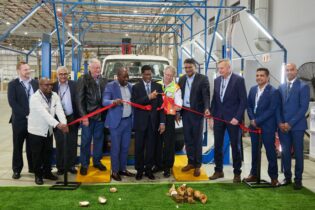A new, asset-light, proactive and customer-focused approach to
transport is yielding benefits for clients of Imperial Managed Logistics, a newly created operating company within the Imperial Logistics stable.
Its flexibility and scalability are further benefits of the Imperial Managed Logistics model. “This scalability enables us to cater for clients with very different requirements in terms of volumes, and for loads ranging in value from R125 000 to R8 million. It is also an efficient way to handle the challenge of fluctuating demand and peak periods, as additional capacity can be brought in as and when required.” The company did some 220 000 loads last year, with up to 1 000 loads a day at peak, Rossouw reveals.
Specialised vehicles are available to Imperial Managed Logistics through different service providers. Rossouw elaborates on the company’s approach to client’s specialised requirements: “Imperial Managed Logistics’ tailor-made solution for clients Sumitomo Rubber and Bridgestone Tyres included Imperial building specialised trailers. We purchased trailers to handle 80% percentof the client’s volumes on dedicated routes. At peak, however, we bring in other suppliers’ vehicles. This approach enables us to get full use of a specialised asset.” Intermodal solutions are also offered by Imperial Managed Logistics, and the company is able to bring rail into the mix when it benefits the client, he adds. A Memorandum of Understanding signed with Transnet Freight Rail is enabling Imperial Logistics to build a relationship with the organisation, in order to leverage road and rail logistics capabilities to reduce road congestion and greenhouse gas emissions, and to lower transport costs for customers. While Imperial Managed Logistics doesn’t always own the assets, it does still take full ownership of all loads. “In terms of visibility and reporting, we take full ownership of the product, so that our clients can enjoy peace of mind and a total, end-to-end logistics solution,” Rossouw stresses. Sub-contractors’ vehicle maintenance requirements are part of their contractual agreements with Imperial Managed Logistics, and regular audits are in place, to ensure vehicle and driver quality. Augmenting this is Imperial’s drive to get suppliers to pursue Road Transport Management System (RTMS) accreditation. RTMS is a nationally recognised, self-regulating scheme for heavy vehicle road transport, aimed at creating a safe, equitable and competitive heavy vehicle logistics value chain. Imperial Managed Logistics’ strategy going forward is to grow into Africa, and Rossouw anticipates an increase in opportunities with new customers and new volumes. For clients moving their goods into several African markets, the Imperial Managed Logistics’ operating model has big advantages. “Many asset-based operators and transporters operate only between South Africa and one other country, which means that clients have to deal with several different companies to reach selected cross-border destinations. Imperial Managed Logistics, however, serves as a single point of contact. It engages directly with the client to assess transport requirements and with suppliers to provide the required capacity, routes and vehicles. The best possible solution can then be designed for the client’s specific needs,” he concludes.





